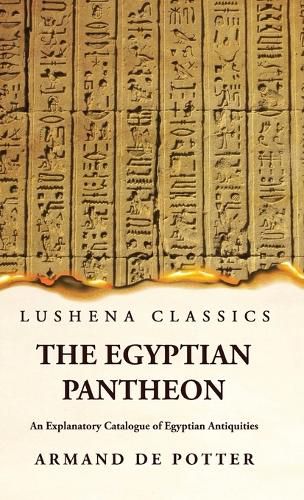Readings Newsletter
Become a Readings Member to make your shopping experience even easier.
Sign in or sign up for free!
You’re not far away from qualifying for FREE standard shipping within Australia
You’ve qualified for FREE standard shipping within Australia
The cart is loading…






This title is printed to order. This book may have been self-published. If so, we cannot guarantee the quality of the content. In the main most books will have gone through the editing process however some may not. We therefore suggest that you be aware of this before ordering this book. If in doubt check either the author or publisher’s details as we are unable to accept any returns unless they are faulty. Please contact us if you have any questions.
About the BookTexts on the history of ancient Egypt span the period from the early prehistoric settlements of the northern Nile valley to the Roman conquest, in 30 BC. The Pharaonic Period dates from the 32nd century BC, when Upper and Lower Egypt were unified, until it fell to Macedonian rule in 332 BC. In 305 BC, Ptolemy, one of Alexander the Great's generals, took the title of Pharaoh, and as Ptolemy I Soter ("Saviour") founded the Ptolemaic dynasty that ruled Egypt for nearly 300 years.
Also in this BookThe history of Egypt is long and rich, and is described in numerous texts. Among the Seven Wonders of the Ancient World, the Great Pyramid of Giza is the only one that still stands. Ancient Egyptian civilization began from around 3150 BC under the first pharaoh of the First Dynasty, Narmer. Egyptian rule lasted until the conquest by the Achaemenid Empire in the sixth century BC. In 332 BC, Alexander the Great conquered Egypt, toppling the Achaemenids and establishing the Hellenistic Ptolemaic Kingdom. Roman rule in Egypt (including Byzantine) lasted from 30 BC to 641 AD. After the Muslim conquest, parts of Egypt became provinces of successive Caliphates and other Muslim dynasties. Egypt remained under Ottoman rule until 1867, except for the brief French occupation (1798 to 1801). Egypt fell under British control in 1882 following the Anglo-Egyptian War. The British occupation lasted until the Anglo-Egyptian agreement of 1954.
And in this BookEgypt as a country has a verylong history, and is considered one of the cradles of civilisation. Famous for the pyramids at Giza and other ruins throughout the country, Egypt is a country popular with scientists and tourists. The Nile river, the longest river in the world, runs through the country. Most of Egypt is covered in desert, with large sand dunes, but with fertile regions close to the Nile and throughout the Nile river delta.
$9.00 standard shipping within Australia
FREE standard shipping within Australia for orders over $100.00
Express & International shipping calculated at checkout
This title is printed to order. This book may have been self-published. If so, we cannot guarantee the quality of the content. In the main most books will have gone through the editing process however some may not. We therefore suggest that you be aware of this before ordering this book. If in doubt check either the author or publisher’s details as we are unable to accept any returns unless they are faulty. Please contact us if you have any questions.
About the BookTexts on the history of ancient Egypt span the period from the early prehistoric settlements of the northern Nile valley to the Roman conquest, in 30 BC. The Pharaonic Period dates from the 32nd century BC, when Upper and Lower Egypt were unified, until it fell to Macedonian rule in 332 BC. In 305 BC, Ptolemy, one of Alexander the Great's generals, took the title of Pharaoh, and as Ptolemy I Soter ("Saviour") founded the Ptolemaic dynasty that ruled Egypt for nearly 300 years.
Also in this BookThe history of Egypt is long and rich, and is described in numerous texts. Among the Seven Wonders of the Ancient World, the Great Pyramid of Giza is the only one that still stands. Ancient Egyptian civilization began from around 3150 BC under the first pharaoh of the First Dynasty, Narmer. Egyptian rule lasted until the conquest by the Achaemenid Empire in the sixth century BC. In 332 BC, Alexander the Great conquered Egypt, toppling the Achaemenids and establishing the Hellenistic Ptolemaic Kingdom. Roman rule in Egypt (including Byzantine) lasted from 30 BC to 641 AD. After the Muslim conquest, parts of Egypt became provinces of successive Caliphates and other Muslim dynasties. Egypt remained under Ottoman rule until 1867, except for the brief French occupation (1798 to 1801). Egypt fell under British control in 1882 following the Anglo-Egyptian War. The British occupation lasted until the Anglo-Egyptian agreement of 1954.
And in this BookEgypt as a country has a verylong history, and is considered one of the cradles of civilisation. Famous for the pyramids at Giza and other ruins throughout the country, Egypt is a country popular with scientists and tourists. The Nile river, the longest river in the world, runs through the country. Most of Egypt is covered in desert, with large sand dunes, but with fertile regions close to the Nile and throughout the Nile river delta.